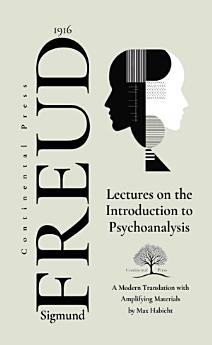Lectures on the Introduction to Psychoanalysis
მაი. 2024 · The Collected Complete Works of Sigmund Freud წიგნი 11 · Continental Press
ელწიგნი
450
გვერდი
family_home
მისაღები
info
reportრეიტინგები და მიმოხილვები დაუდასტურებელია შეიტყვეთ მეტი
shoppingmodeფასის 52%-ით შემცირების თარიღი: 9 ივნ
ამ ელწიგნის შესახებ
A modern rendering of Sigmund Freud’s renowned 1916 Lectures on the Introduction to Psychoanalysis (Vorlesungen zur Einführung in die Psychoanalyse), a series of lectures that provide a comprehensive and accessible overview of psychoanalytic theory and practice. Originally delivered to a general audience, these lectures offer a clear and systematic introduction to Freud’s key concepts, including the unconscious, dream interpretation, the Oedipus complex, and the mechanisms of defense. They also contain some of Freud’s most incisive social commentary, including a critical analysis of Marxism and its psychological implications. In these lectures, Freud outlines the fundamental principles of psychoanalysis, emphasizing the role of the unconscious in shaping human behavior and mental processes. He explores the significance of dreams as expressions of repressed desires, the influence of childhood experiences on adult personality, and the dynamics of transference in the therapeutic relationship. Freud’s engaging and often witty style makes these lectures an ideal entry point for readers new to psychoanalysis, while his depth of insight ensures their enduring relevance for scholars and practitioners. Freud’s critique of Marxism, included in these lectures, reflects his broader skepticism of political ideologies that claim to offer universal solutions to human suffering. He argues that such ideologies often overlook the complexity of human nature and the deep-seated psychological conflicts that underlie social and political behavior. This critique remains a provocative and timely contribution to the study of psychology and society. This fresh, modern translation from the original German manuscript breathes new life into these historically significant works. Freud’s extensive writings have often been inaccessible to the general reader, and this edition seeks to bridge that gap by providing direct access to his original ideas. The Reader’s Edition introduces Freud’s work in context, with an illuminating Afterword that explains his philosophical project, situates it within the Modernist milieu, and explores its enduring impact on contemporary thought. The Afterword also examines the relationship and intellectual conflict between Freud and Carl Jung, particularly their differing views on the interpretation of social phenomena. While Freud emphasized the role of repressed desires and childhood experiences, Jung focused on the collective unconscious and archetypal symbols. Accompanied by a timeline of Freud’s life and works, an index of philosophical terminology, and a short biography, this edition is an indispensable resource for students, scholars, and anyone interested in the origins of psychoanalysis. The inclusion of supplemental materials, such as illustrations and a glossary of Freudian psychological terms, enhances the reader’s understanding of this complex and historically important work. Whether you are a seasoned scholar or a curious newcomer, this volume offers a comprehensive and accessible introduction to Freud’s groundbreaking theories and their enduring relevance to the study of the human mind.
ავტორის შესახებ
Sigmund Freud (1856-1939) was an Austrian neurologist and the founder of psychoanalysis, a groundbreaking approach to understanding the human psyche. Freud introduced concepts such as the unconscious mind, repression, and the tripartite structure of the psyche, which includes the id, ego, and superego. His work, including seminal texts like The Interpretation of Dreams and Beyond the Pleasure Principle, emphasized the role of unconscious drives and childhood experiences in shaping behavior and personality. Freuds theories on sexuality, defense mechanisms, and dream analysis challenged societal norms and profoundly altered the field of psychology, influencing literature, art, and philosophy. Though controversial, his contributions laid the foundation for modern psychotherapy and continue to spark debates and inspire new approaches to understanding human behavior and mental processes.
შეაფასეთ ეს ელწიგნი
გვითხარით თქვენი აზრი.
ინფორმაცია წაკითხვასთან დაკავშირებით
სმარტფონები და ტაბლეტები
დააინსტალირეთ Google Play Books აპი Android და iPad/iPhone მოწყობილობებისთვის. ის ავტომატურად განახორციელებს სინქრონიზაციას თქვენს ანგარიშთან და საშუალებას მოგცემთ, წაიკითხოთ სასურველი კონტენტი ნებისმიერ ადგილას, როგორც ონლაინ, ისე ხაზგარეშე რეჟიმში.
ლეპტოპები და კომპიუტერები
Google Play-ში შეძენილი აუდიოწიგნების მოსმენა თქვენი კომპიუტერის ვებ-ბრაუზერის გამოყენებით შეგიძლიათ.
ელწამკითხველები და სხვა მოწყობილობები
ელექტრონული მელნის მოწყობილობებზე წასაკითხად, როგორიცაა Kobo eReaders, თქვენ უნდა ჩამოტვირთოთ ფაილი და გადაიტანოთ იგი თქვენს მოწყობილობაში. დახმარების ცენტრის დეტალური ინსტრუქციების მიხედვით გადაიტანეთ ფაილები მხარდაჭერილ ელწამკითხველებზე.











